Michigan cannabis lab CEO says hidden substances could taint vape pens, edibles
The CEO of a cannabis testing company with a lab in Michigan said substances that could be harmful to consumers have been found in cannabis oil used in edibles and vape pens and is calling out marijuana companies for not disclosing they are using them.
Josh Swider, cofounder and CEO of Infinite Chemical Analysis Lab, which has facilities in Jackson and also in San Diego, said more than 30% of marijuana vape pens and edibles his lab recently tested contained a diluting agent; a synthetically converted cannabis oil; or pesticides, some of which are not allowed by the state. He also said the brands haven't disclosed that the substances are in their products.
"If someone told me (that) I'm smoking cannabis product that's purely extracted from safe marijuana in Michigan, good. I trust that," Swider said in a March interview with the Detroit Free Press.
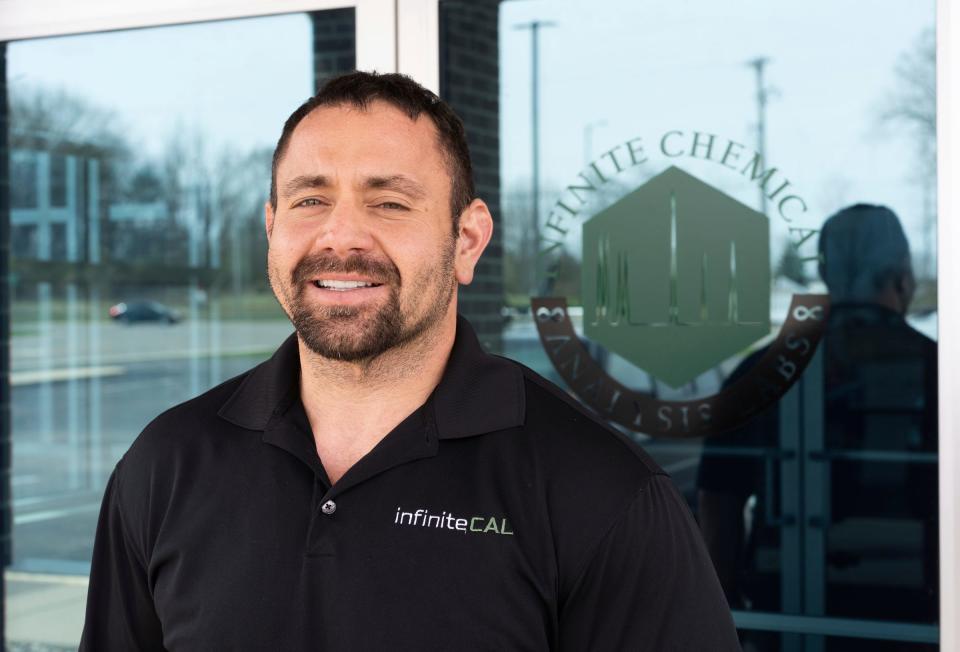
"If you told me, 'Hey, if you go into a marijuana store in the state of Michigan, you have a 33% chance of smoking conversion that's synthetically produced' ... I would want to know that," he said, referring to oil that's synthetically converted into THC — the oil that produces the "high" feeling.
Testing for the diluting agent, which is known as MCT (medium chain triglycerides) oil, and the converted oil are outside of the scope of what marijuana laboratories in Michigan typically do. A group concerned about cannabis safety in Michigan, which Swider declined to name, asked him to develop tests to see whether products the group obtained had the substances in them. Swider shared the results with the Detroit Free Press because he said he also is personally concerned about the safety of marijuana products and wants the public to be aware.
If companies use MCT oil in Michigan, which is derived from coconut oil, it needs to be disclosed and then approved by Michigan's Cannabis Regulatory Agency, he said. MCT oil is banned in marijuana products intended for inhalation in some states, like Colorado, following the outbreak of vaping-related lung illnesses in 2019.
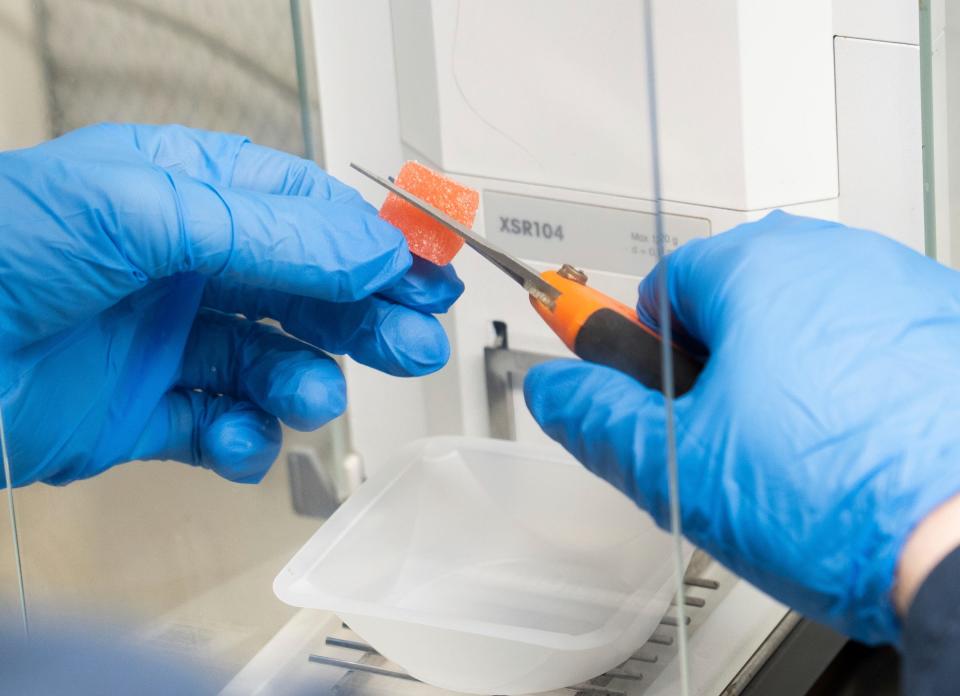
The synthetic conversion of CBD oil into THC oil is a process that's similar to how a pharmaceutical drug would be made, Swider said.
"I am not going to stand up there and say it's 100% unsafe," he said. "But there's no one that can stand there and say it is 100% safe."
'This is uncharted territory'
Vape pens are a popular way to consume cannabis: They're discreet and can fit into a pocket. They consist of a battery with a cartridge that screws on top. The cartridge contains cannabis oil, which is heated by the battery.
While marijuana flower itself has been the biggest seller since cannabis started being sold for recreational purposes in December 2019, in terms of total sales, customers have spent more than $54 million on vape cartridges since that time and $26 million on edibles, according to the most recent monthly data from the CRA.
In 2019, just before sales of recreational marijuana began, the state mandated a temporary halt to the sale of marijuana vapes and ordered that a sample of each batch from every dispensary get retested in the medical market because of the vaping-related illnesses and deaths that have come from illicit market vapes.
Most of the vapes associated with the illnesses, called EVALI by health officials, had contained vitamin E acetate, which had been used to dilute THC to make it easier to fill vape cartridges. Testing has shown it isn't harmful when it's ingested as a dietary supplement or applied to the skin, but it can interfere with normal lung function when inhaled.
MCT oil, similarly, is a food-safe ingredient. Dr. Adie Rae, an assistant scientist at Legacy Research Institute based in Portland, Oregon, who studies cannabis vapor in animals, likened it to spraying cooking oil on a pan and then eating the eggs that were cooked on that pan. That's safe.
"Spraying cooking oil onto the inside of your lungs is probably not a good idea," she said. "The lungs are an incredibly delicate organ. There are so many tiny little microscopic components inside your lungs that are highly sensitive to environmental toxins."
When people inhale anything other than air, the super sensitive tissue of the lungs can become inflamed, Rae said, and that inflammation can turn into things like bronchitis and pneumonia. Sometimes, people can even have a lung that collapses, she said.
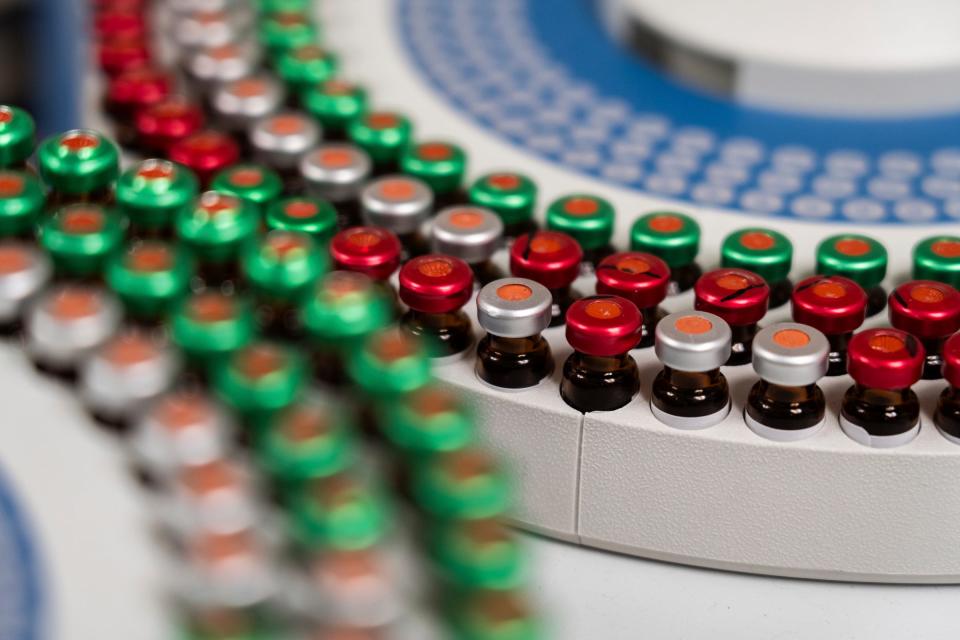
Rae said now that producers can no longer use vitamin E acetate to dilute THC, some have started using MCT oil.
"This is uncharted territory," Rae said. "Never before in human history on planet Earth have people been spraying MCT oil on the inside of their lungs. Is it safe? We have no idea."
What's especially concerning, she said, is that consumers who are inhaling MCT oil have no idea they're doing it.
Dropping potency levels led to questions
Since sales of recreational marijuana started in Michigan nearly five years ago, private safety compliance facilities have tested every product for potency, pesticides and mold, among other required tests, a necessary step before products can be sold to consumers.
Swider said that in the last few months, he noticed that the potency levels for many vape pens were dropping, leading him to ask himself, "OK, what else is in there?"
When he was approached by the group concerned about product safety in Michigan, he developed tests to see if MCT oil and conversion oil were present in products.
The group purchased 200 products at Michigan recreational marijuana dispensaries from nearly 60 brands. Sixty-nine of the 200 samples that were tested for conversion oil, MCT oil or pesticides were found to contain at least one of the substances, according to Swider. Swider declined to name the brands whose products he tested.
Swider described the test he developed to see if products contain MCT oil as "just the first stop on the train."
"There are other stops that will be coming in the future," he said. "There's other pollutants or contaminants being added to vape pens to dilute out the THC ... it takes a lot of money and time to do this."
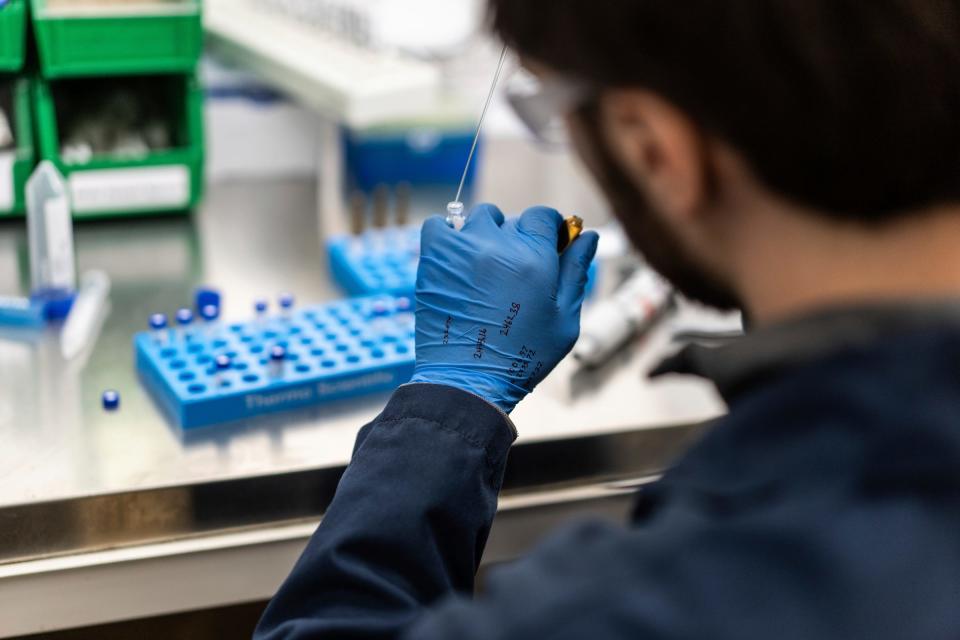
What happens now
In the absence of a state-run testing lab, Swider is taking on the job he believes the state should eventually do.
"It's looking forward at potential health risks to the public," he said.
Robin Schneider, executive director of the Michigan Cannabis Industry Association, which has more than 400 members, including Infinite Chemical Analysis, said she's proud of the scientists behind this effort.
"This new methodology is a huge topic of interest among our members," she said in a text. "When able to be used for enforcement purposes, it will improve our industry protecting Michigan businesses and consumers."
The state knows safety could be an issue
While a spokesperson for the CRA didn't have a comment on the findings, the agency sent out an email Monday addressed to all industry stakeholders that said, "Evidence of the use of any ingredient not approved by the FDA for its intended use will be reviewed by the CRA and could lead to investigation and sanctions imposed on the licensee."
In a response to a question about whether conversion oil is allowed in Michigan, David Harns, a spokesperson for the CRA, said in an email: "We intend to make it clear in the new rule set that CBD to THC conversion is prohibited in Michigan." The prohibition on conversion was included in the proposed changes to the marijuana rules the state put out nearly a year ago.
CRA Executive Director Brian Hanna was brought in to lead the agency in part because of his enforcement background. He frequently says that illicit cannabis is an issue in the regulated industry that he's addressing.
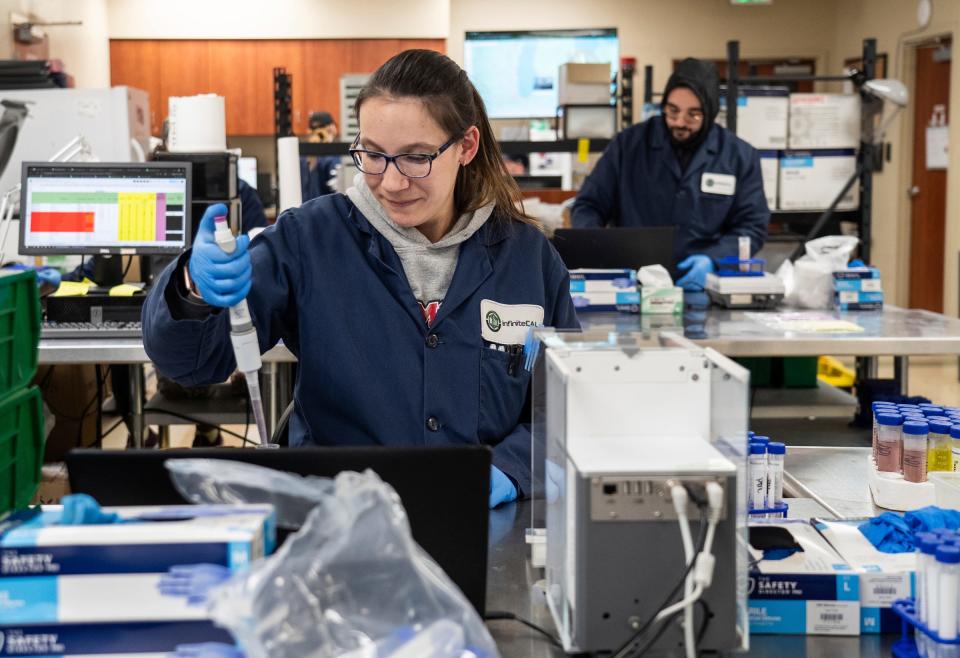
This also isn't the first time the safety of cannabis products sold in the regulated market has been questioned. A massive recall in 2021 of marijuana products tested by a lab has left lingering questions about how products are tested and what makes its way to store shelves. In that instance, the CRA recalled the products because it found inaccurate and/or unreliable results for many marijuana products tested by the lab, but the lab sued and a judge limited the scope of the recall.
More on the cannabis testing industry: Michigan’s cannabis testing industry like ‘Wild Wild West’: What it means for consumers
An issue that was raised as part of that recall is that private cannabis testing labs are motivated, at least in part, by money, and they can lose clients if the products don't come back with the results clients were hoping for.
Cannabis producers, meanwhile, are all trying to get a piece of the $3 billion industry in Michigan but the low prices consumers pay often mean slim profit margins for the companies, an issue that Swider says is in part brought on by bad actors in the industry who use MCT oil or conversion oil.
Swider said the price for a liter of conversion is about $500. Meanwhile, the price for a liter of distillate (THC oil) in Michigan right now is around $3,500.
A gram vape pen can cost as little as $6 at a dispensary.
"How do you do that?" he said. "Someone do the math for me."
How a state-run testing lab could help
By coming out with this information, Swider said he will create enemies and potentially lose clients.
"This should not be a part of my regime of making sure there's public safety because I'm not getting paid for it," he said, citing the lack of a state-run lab as one reason he feels it's on him to say something. A state testing lab is scheduled to open by the end of the year, Harns said.
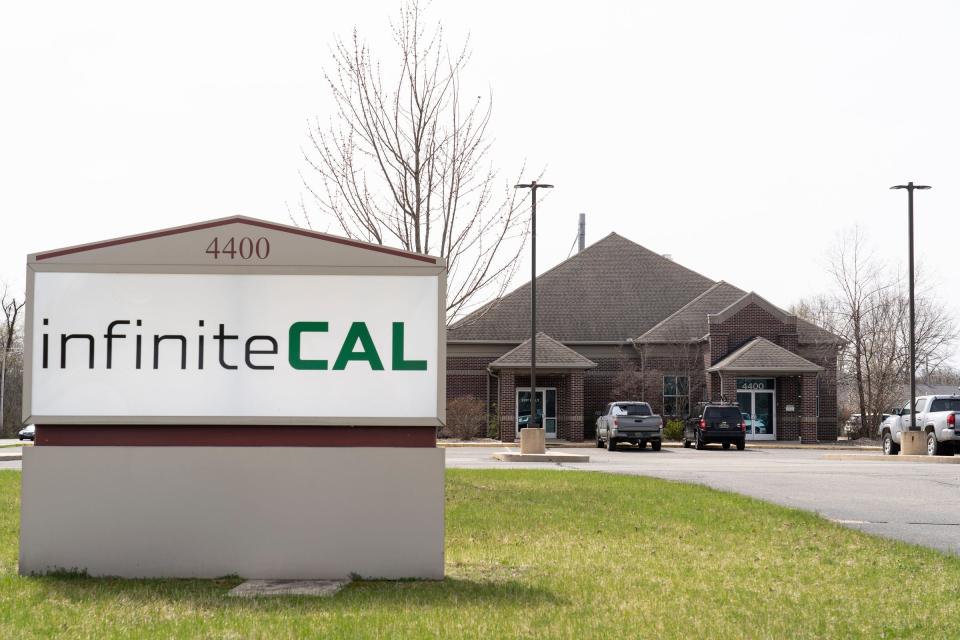
The findings also raise questions about whether there should be a recall for products that were found to have MCT oil, conversion oil or pesticides. This has happened in other states.
For example, in Missouri, a state that just recently legalized recreational marijuana, the state issued a massive recall in August of marijuana products that contained distillate mostly made up of the converted oil.
Still, experts say regulated cannabis is safer than the illicit market
Rae would suggest only buying solventless hash cartridge pens, "things that are 100% unadulterated cannabis" until more research can be done on the safety of these substances.
She noted that the risks are always exposure-dependent, meaning the more consumers use vape pens, the more they should be concerned.
Rae also said it's important consumers don't turn to the illicit market, where products are often cheaper, but aren't lab tested.
"Just don't use informal sources, especially for things that you're going to spray onto your lungs," she said.
Contact Adrienne Roberts: amroberts@freepress.com.
This article originally appeared on Detroit Free Press: Cannabis lab CEO says hidden substances could taint vape pens, edibles

